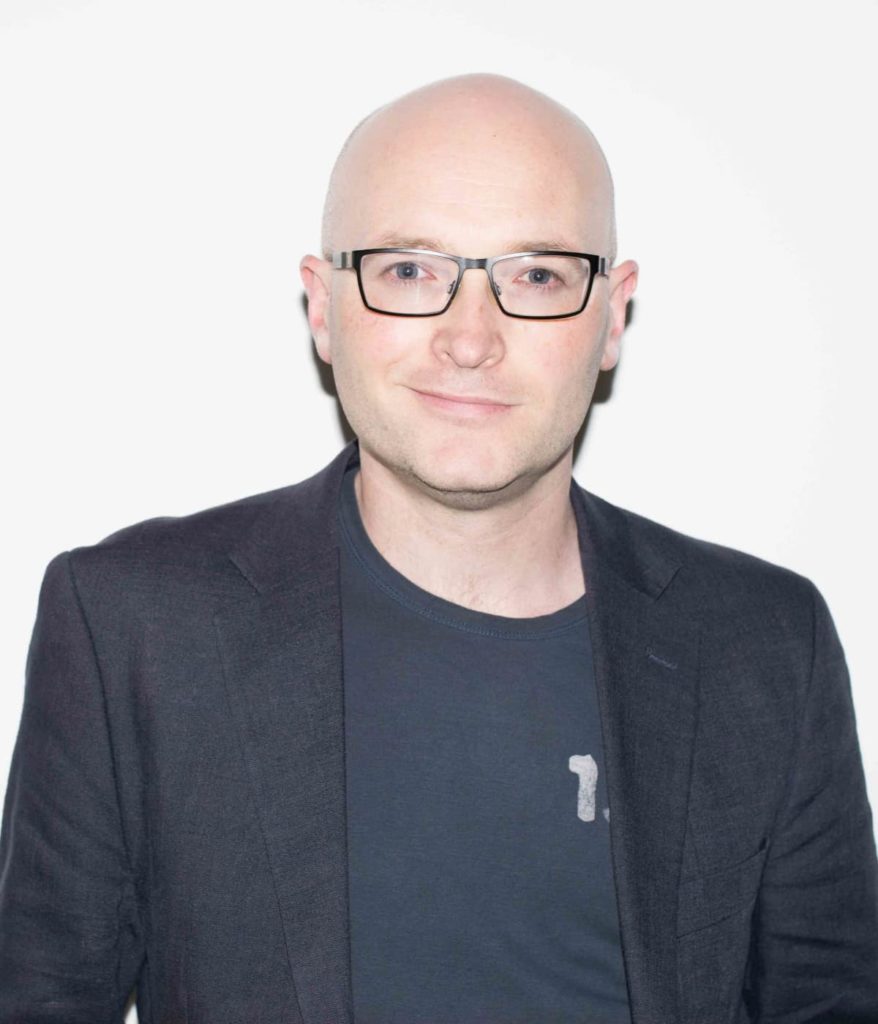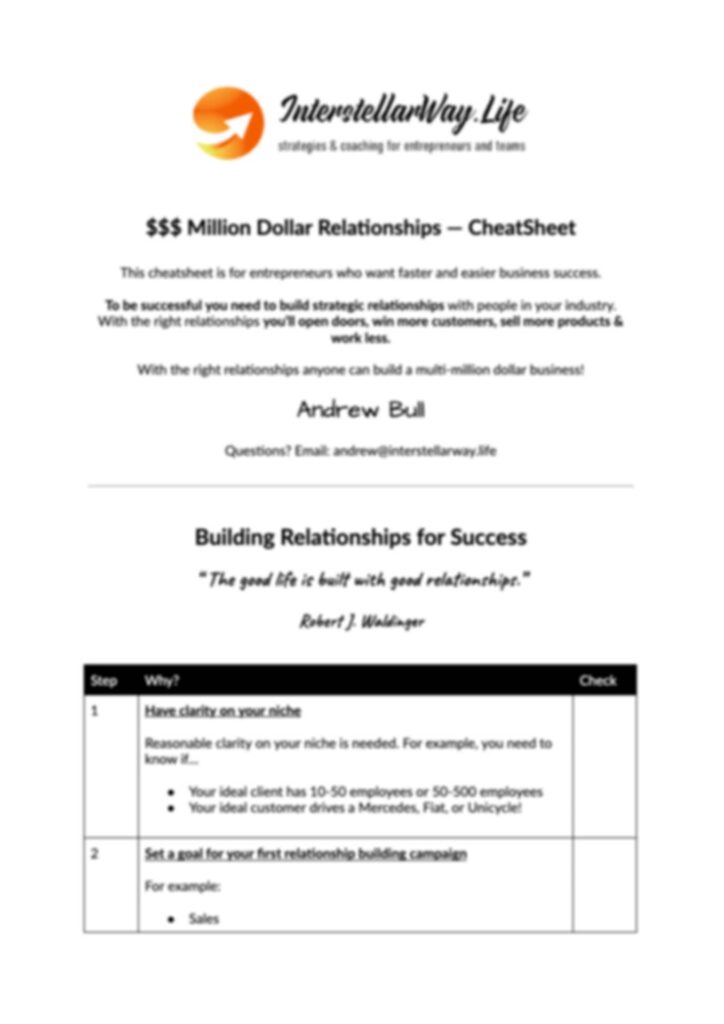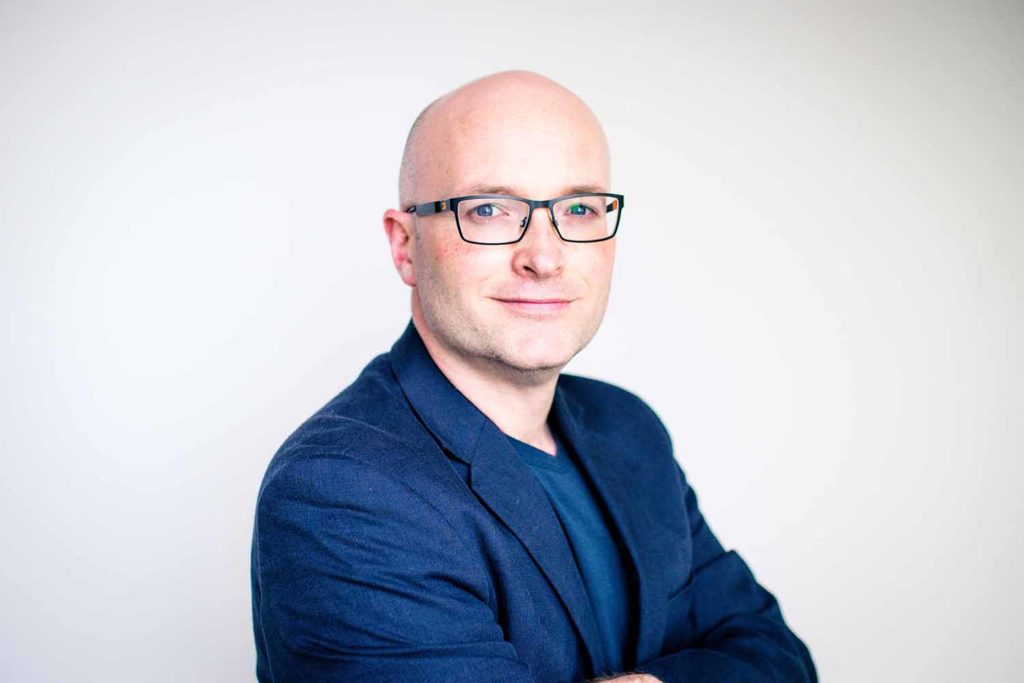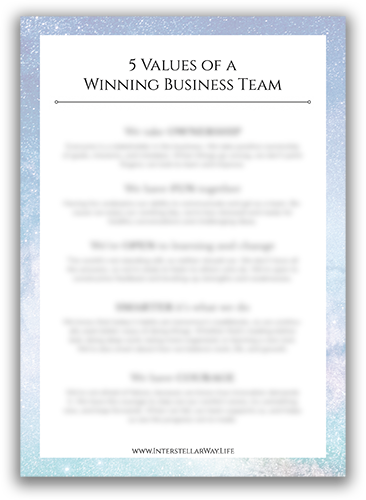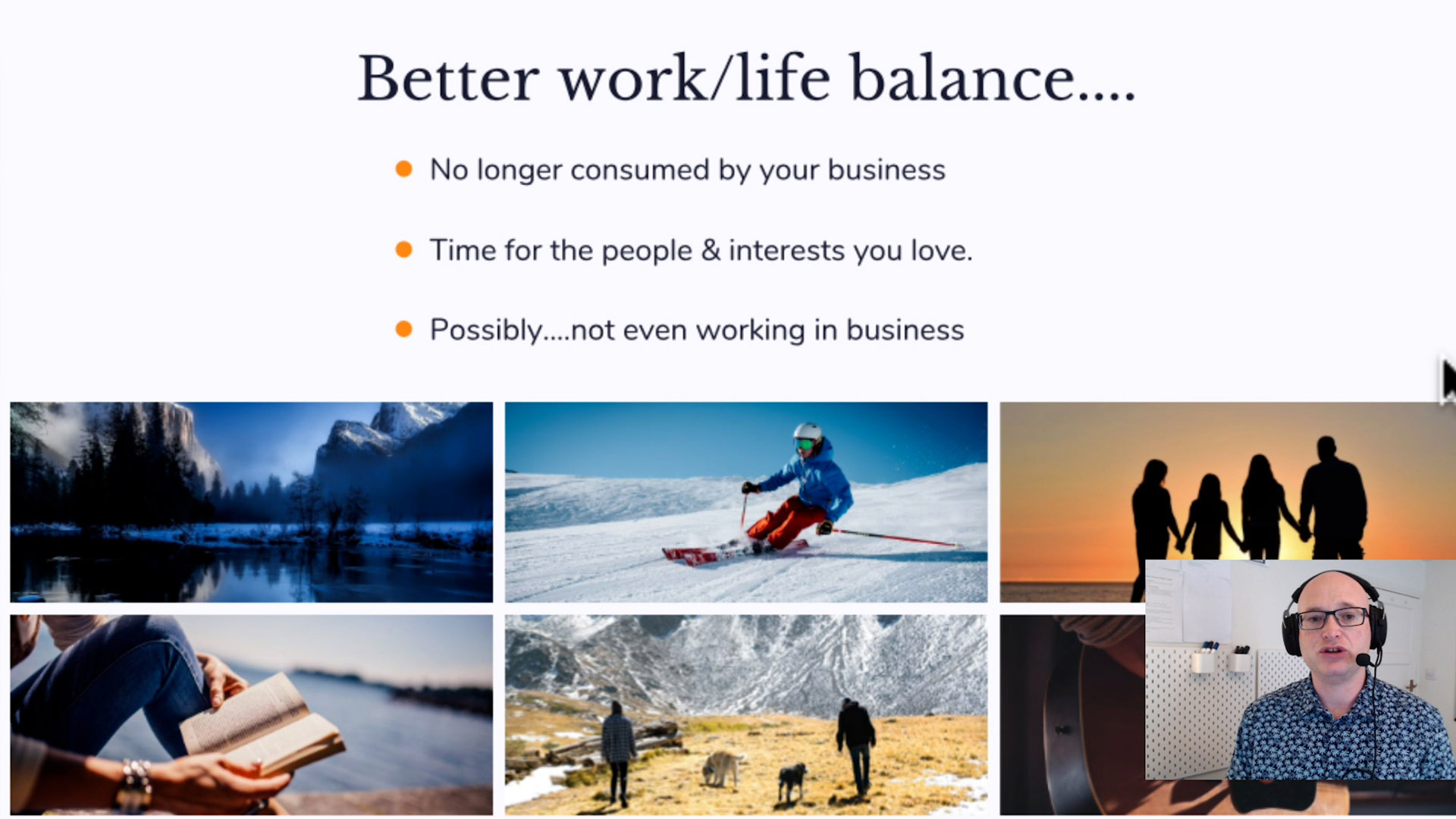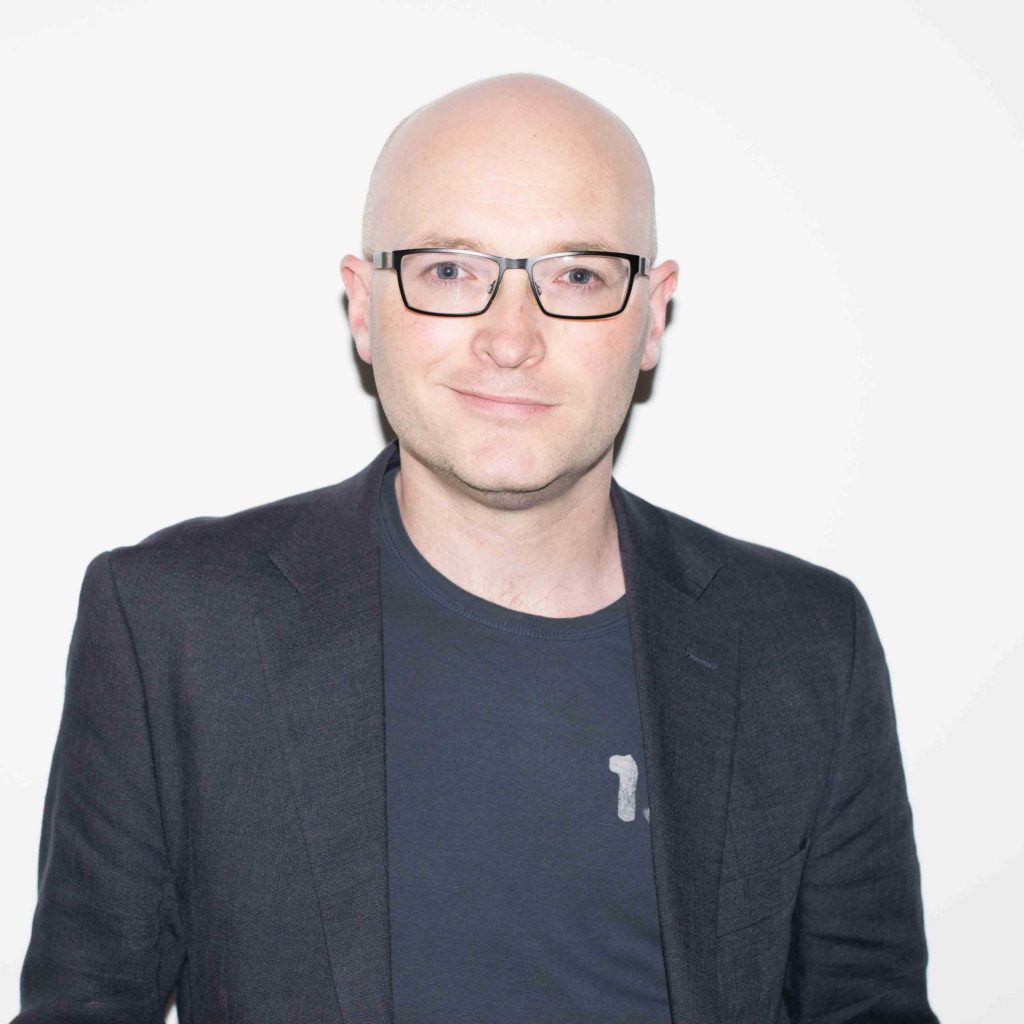Interstellar Business Show
Podcast for Technology CEOs and their teams.
It's time to grow your mind, elevate performance, and own your future 🚀
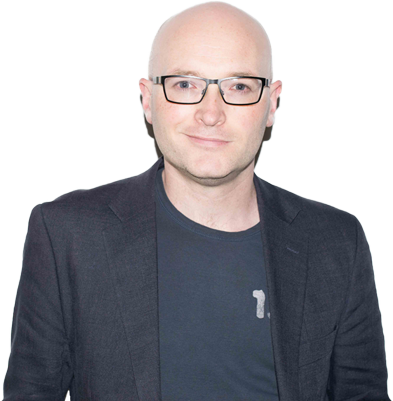
Interstellar Business Show
Episode: 0028
Listen.Innovate.Grow - Michael Haynes on how to market and sell in 2022 and beyond
Featuring....

Episode Introduction
Do you know with absolute certainty where your ideal customers hang out…
- Do you know where they go to learn and discover new things?
- Do you know what they’re looking to learn?
Is your knowledge of your customers so certain and absolute… that you would stake your business on it?
Or instead….
Is your business making a lot of assumptions about customers?
Are you perhaps wasting your time on ineffective strategies and things like social media posting or paid advertising…
When another approach might pay dividends for your business?
Now, if you think your business your business might be wasting it’s marketing and sales resources…
Don’t worry…
Because, today I’m joined by an expert guest who’s going to share insights that will help you learn
- What most B2B companies get wrong when trying to find new customers
- A method for discovering where your ideal customers really hang out
- How to give potential customers the fresh AIR they’re looking for — don’t worry that will make sense later!
- Lastly, you’ll get actionable steps for improving your marketing and sales.
Now, before we get started with today’s show and meet our guest, please make sure you subscribe and follow us wherever you’re listening today. So you never miss an episode again.
In depth show notes are available at interstellar.show
Episode notes & resources
More about Michael Haynes, SME Business Growth Specialist
Find and connect with Michael here…
Website address: https://listeninnovategrow.com/
My LinkedIn page: https://www.linkedin.com/in/michaelhhaynes/
Lead Magnet (SME CEO Growth Checklist) https://listeninnovategrow.com/sme-playbook/
Love this podcast episode? Please leave a review here
Listen to more episodes here: Interstellar.Show
Get Andrew’s free Resources for Tech companies with teams → https://bit.ly/2Ygyoij
Join Andrew’s Interstellar Community → https://interstellarway.life/sign-up-for-newsletter/
Transcript
Please note, this transcription is autogenerated, so there may be errors.
[00:00:00] Andrew Bull: I’ve got a question for you. Do you 100% know where your ideal customers are hanging out. Do you know, where they go to learn and discover new things? Do you know what they’re looking to learn and understand? Is your knowledge of your customers, so certain and absolute that you would stake your business on it?
Or instead is your business making a lot of assumptions about future customers? Are you perhaps wasting your time on ineffective strategies and things like. Social media posting or paid advertising. When another approach might pay dividends for your business. Now. If you think your business might be making this mistake and wasting its marketing and sales budget on things that aren’t working.
You’re not alone because I’ve made those mistakes. I’ve spent hard earned cash on marketing and sales strategies. Trying to reach people in the wrong places and give them things that they didn’t want. So don’t worry. You’re not going through this alone, but here’s the good news today. I’m joined by an expert guest. Who’s going to share some insights that will help you overcome this challenge.
In today’s show, you will learn. What most B2B companies get wrong when they’re trying to find new customers. A method for discovering where your ideal customers really hang out. And you’re going to learn how to give. Potential customers, the fresh air they’re looking for. And don’t worry about what that air is. That’s what become clear later in the show.
Lastly, you’ll get actionable steps for improving your marketing and sales. So you can go and find your future customers where they actually are, and also deliver the value that they’re looking for.
Now, before we get started with today’s show. And meet our expert guest. Please make sure you subscribe and follow us wherever you’re listening today. So you never miss an episode again.
Welcome to the show Michael. Michael Haynes is a SME business growth specialist. Thanks for being here, Michael.
[00:02:20] Michael Haynes: Thanks for having me, Andrew. Great to be here.
[00:02:22] Andrew Bull: And you’re the author of a book, is that right?
[00:02:24] Michael Haynes: Yes, that’s correct, Andrew. My book is called listen, innovate, grow a guide book for startups and SMEs to acquire and grow business customers.
[00:02:33] Andrew Bull: That sounds like the kind of book that people need to be putting on their shelves. We’re not putting on their shelves, putting in their hands and reading just before they go to bed or when they need to get some great ideas during the day.
[00:02:44] Michael Haynes: Absolutely. It’s meant to be a guidebook. So to be read written, you know, um, Bowled over pages, it’s really to help business leaders to really help them execute on how they do exactly that acquire, retain and grow the business customer. So this is written only solely for us in the B2B space, and it’s really to give them the tools, practical approaches and strategies to help, uh, startups and small medium businesses achieve.
[00:03:09] Andrew Bull: Let’s move forward, swiftly into the first segment of the show, which is called
Michael, what secret don’t people know about you?
[00:03:20] Michael Haynes: Well, I guess a secret Andrew that people don’t know about me is that, um, you know, to do your master’s of business administration, you have to write the. Management admissions tests, the GMAT, uh, that is something I struggled with quite a bit and had to rent a couple of times. And during which, uh, the first time I was trying to study and prepare for that, I was also working full time and also looking after my mother who was dealing with ovarian cancer at the time.
So it was a very trying time for me in my young 20 somethings trying to juggle work, um, dealing with, with my mom and also trying to study for this horrendous business entrance to.
[00:03:58] Andrew Bull: did you gain anything from that experience? Marco is I know like a challenging time, but was there anything to take away from it?
[00:04:06] Michael Haynes: Oh, great question, Andrew. I really think from that whole experience, I really, uh, developed a lot of tenacity in terms of really being able to work through tough situations to persevere. Figure out how to get to that end goal, despite, uh, challenges that were put in front of me and dealing with a situation that I’d never encountered before.
So I think those are some, uh, learnings that really came out of that whole.
[00:04:31] Andrew Bull: Okay. And did it shape your perspective at all? Did you, did it make you think when maybe some other people are dragging their feet because they’ve got their own challenges going on? Does it give you some more empathy perhaps?
[00:04:44] Michael Haynes: Um, I guess a bit more empathy. Um, it really shows. How much you can really step up when you put your mind to doing what you want and need and have to do that. You, you really step up, you can achieve what it is you’re looking to achieve. Uh, also really helps to put into perspective what’s important, the importance of family, the importance of health.
And so, um, yeah, putting things in perspective in terms of what’s really important, what really makes.
[00:05:12] Andrew Bull: Yeah. Sometimes we have to go through these big life events to really understand what life matters. So thanks for being so courageous and sharing that with us now, moving back to your career and your origin. In the professional world. Where did you get started? What, what, what was your last role when the corporate.
[00:05:33] Michael Haynes: So my last role, Andrew, I was the head of customer research and analysis, uh, for the wholesale division of the Telstra corporation, which is Australia’s largest telecommunications company. And Andrew it’s really in that final corporate role that I really got into the B2B space, as I was responsible for setting up their whole customer.
Insights and research function, working with the marketing strategy teams, the sales teams, or product teams to develop and implement, um, essentially B2B marketing sales and product strategies. So it was really from that corporate world and that experience over those five years where I really got into the whole B2B space and seeing the opportunities, understanding how.
[00:06:17] Andrew Bull: So was it helpful going into an established business where all these marketing and B2B systems and processes were already in place?
[00:06:26] Michael Haynes: Well, Andrew, in fact, uh, there weren’t the strategies and systems in place. When I joined, uh, in that role, it was a brand new role. A new division. So I had to not only learn about B2B strategy research, but also building and setting up the strategy, the systems and the processes. So learned a lot about not just strategy development, but how also, how to execute and get those programs and initiatives in place.
[00:06:51] Andrew Bull: Wow. So it sounds like you’ve got quite a innovative mind there and like doing your research as well then, Michael.
[00:06:57] Michael Haynes: Ah, yes, very much like do my research and it was about learning and leading and implementing at all at the same time.
[00:07:04] Andrew Bull: How did this lead to where you are now in terms of your own business?
[00:07:08] Michael Haynes: It’s really where I got really in depth into the whole B2B space. In terms of how do you go about understanding business customers? How do you develop products, services, and solutions? For those business customers. How do you understand them? How to engage and interact with them, all those fundamental learnings of what you need to do to acquire, retain customers.
Uh, the foundation of those principles and approaches. I really learned, uh, at the Telstra corporation and then applied them in an appropriate context for small and medium sized businesses.
[00:07:40] Andrew Bull: it’s interesting that you’re talking about principles because I think those are so important to, to learn and really. Installing the foundation of our approaches to what we do as entrepreneurs and leaders, which really nicely moves us on to the next part of the show, which is called
Michael, what’s your big idea?
[00:08:02] Michael Haynes: So Andrew, my big idea is that to acquire, retain business customer, to drive business growth, it requires the interaction of three core areas. You have the. True. Strategic marketing, business innovation, and proper B2B selling. And it’s all three that you need to have altogether. That is what is going to enable you to acquire those business clients and customers retain them and drive the growth that you’re able to seek.
All three, have to work together in tandem and working cross-functionally within your company. That’s what’s needed for success.
[00:08:37] Andrew Bull: so what do we mean by success?
[00:08:40] Michael Haynes: Well, I mean by success, achieving those goals that business leaders are often looking to achieve, which is about acquiring business clients, retaining those clients, getting them to spend more, um, getting them to be your advocates and refer for you and act as an advocate in the marketplace for you. Um, in order to achieve those things, uh, requires both three elements to really depict.
Uh, and nurture and engage with business clients and customers that you’re going after to achieve both businesses.
[00:09:09] Andrew Bull: why those three things. I mean, they seem kind of obvious in some regard by OSA. I think sometimes we need. Mull over was obvious and just brief reaffirm why it needs to be those things. Why strategic marketing, business, innovation and sales, why not? Marketing negotiation and sales?
[00:09:32] Michael Haynes: Well, you need all three by, uh, by virtue of the way of how the business buyer to, how do business buyers buy? Uh, they do a lot of, there are multiple stakeholders involved. Well, independent research. They have multiple priorities, truth, strategic marketing. Andrew is about having an in-depth understanding of your customers, of those decision makers, who they are, what are their priorities and how they buy.
So you really need to be buyer-driven. And insight-driven many organizations do a lot of marketing, but they do a lot of tactics without that depth of understanding around the business customers and business buyers. And that is your starting point, which I call listening.
[00:10:12] Andrew Bull: Okay.
[00:10:13] Michael Haynes: That’s absolutely fundamental.
[00:10:14] Andrew Bull: Yeah. Listening is a powerful tool that we can use as a business leaders. Right.
[00:10:20] Michael Haynes: Absolutely. And it’s fundamental that you understand the business buyers again, across those dimensions of who they are, what are their priorities and objectives and how they buy, because Andrew, that gives you clarity on where to focus as into which industry, to which customer and what are the elements that are going to be important to them so that you will know.
What you need to deliver to your customers, how you need to deliver to them, how you need to, to promote and engage with them so that listen will give you that clarity of where to focus on what activities, where to innovate, what you need to do.
[00:10:54] Andrew Bull: Do you think most business leaders are good listeners? Do you think they’ve set their business up to do that? Or do you find the opposite?
[00:11:03] Michael Haynes: Great question, Andrew, I find that, uh, you team to have one of two extremes in larger organizations, they do lots of listening. So a lot of gathering of insights around the customers around the buyers. The insights are not shared across the organization, across the relevant departments like sales, marketing, customer service, that’s one scenario or in smaller organizations, they don’t do enough listening.
So they don’t really have an understanding as to who are the true decision makers, what are their priorities or objectives and how they buy. So there’s gaps in listening. Um, Not making use of listening insights, which is often characterized at larger organizations or in smaller organization. They’re not doing it.
They’re doing little to no listening at all.
[00:11:48] Andrew Bull: So we need a director of listening within businesses.
[00:11:51] Michael Haynes: Yes, you do need a director of listening, which in your larger organizations, that’s really falls within the whole customer insights and market research. So the larger organization do have that voice of the customer head of customer. That’s often set up it’s in the smaller organizations where they don’t utilize the mechanisms and it’s not part of their DNA, how they operate.
[00:12:12] Andrew Bull: So if I’m a smaller organization, say we have 20 team members, how can I do it then if I can’t really have a specific person for that,
[00:12:22] Michael Haynes: How you can do that. Well, often delegating that to have that being done within your marketing and or sales because marketing and sales need to work together. And it’s really about them sitting together and identifying which sets of customers you really want to be focusing in on and be building an in-depth understanding.
[00:12:40] Andrew Bull: So what is the big problem that we’re trying to actually solve with this correct? Combination of strategic marketing business, innovation and sales.
[00:12:51] Michael Haynes: The big question is. Acquisition and retention of business customers and driving business growth. Andrew, typically the questions I’m getting from business leaders are often they’re looking to grow their business, but they don’t know which customers they should be focusing on to drive the growth.
Where are the growth opportunities, or for example, I had a discussion with a marketing agency today that wanted to understand how to create solutions that business customers want, that they can use. Of growth. These are some of the kinds of that strategic questions, often that are coming up as part of the growth objective that business companies have, that they’re looking to have answered that you need to be using this a tri-factor approach, a strategic marketing business innovation and sales
[00:13:36] Andrew Bull: Is most of the market going against this to most people going down a different approach. And is your idea going against this conventional thinking?
[00:13:47] Michael Haynes: Yeah, a great question, Andrew, there’s a lot of conventional thinking that I would argue that in terms of the marketing alone. Companies focus on lots of tactics. They’re doing social media, they’re doing email marketing. They’re doing these things with no understanding of who their business customers are, how their business customers are researching and making decisions, because that has changed Andrew quite a bit, particularly over the last 12 to 16 months.
And so there’s often a disconnect where I’m talking to clients and prospects, and they’re like, Michael, we implemented a social media campaign who are the decision. Oh, we’re not sure. Well, where are they going for information? Are they going to events round table? We’re not really sure. Are they using social media as a source of information?
We don’t know. Well, then you have a disconnect. Um, and so that’s often happened where people are doing lots of tactics that they’ve heard about, but not understanding if it’s relevant for their clients, their customers, their markets.
[00:14:42] Andrew Bull: Okay. So yeah, a lot of people are doing things which are contrarian to what their goals are?
[00:14:49] Michael Haynes: It’s contrarian or they don’t know if they’re the right things. They’re just doing it because they’ve heard, they’ve read, um, you know, through reading all these blogs and articles that we’re all supposed to have an email funnel, or we all should be on social media, not recognizing, that business buyers, do different things.
Buying behaviors and the different types of approaches that they’re using are changing. They’re going to workshops there. I’m never doing the likes of podcasts or joining online communities, mastermind groups. There’s a variety of ways in which business buyers now are gaining access to the. Insights and information.
They need to inform their buying decision and objectives. You need to make sure you’re in tune with that for your customer, then your markets, so that you’re doing the right kinds of marketing activities, which reflect where business buyers go for information as part of their self-education research and buying journey
[00:15:39] Andrew Bull: That’s interesting to learn how people are buying in different ways through masterminds, podcasts and so on. That’s really interesting to learn, and I think our listeners will appreciate that.
[00:15:49] Michael Haynes: Yes, Andrew, just to add in there. So this concept of these other forms that have been coming up is something that’s been happening over the past six months. And. A thought leader in the states has come up with the term, the dark funnel for this, because these are different activities that many leaders, particularly senior leaders are using to gain, to educate, gain insights from peers, thought leaders, um, that don’t fall into the typical email funnel.
Lead magnet funnel. Many business buyers are moving away from those traceable funnel type traditional marketing. So these other types, which present as opportunities to market, but you really need to understand some of the new ways and different ways in which business buyers are pursuing, uh, information and insights to drive their decision-making and purchase decision.
[00:16:36] Andrew Bull: And is this necessitating, this joined up approach in marketing innovation and sales that you’re advocating.
[00:16:43] Michael Haynes: Yes, it is. Absolutely. Because business buyers now have a lot greater expectations. They’re also having greater expectations, what they expect from sales representatives. So when they do meet with you as a sales person, they’re looking for insights, guidance as to how to move their businesses forward, how your products and solutions are going to enable them to meet their objectives.
So, hence, it’s very important that you have. In-depth understanding of what the business buyers are, what are their priorities, what are they looking to achieve? So that you can respond to it appropriately and deliver the right kinds of products, services, support that they are indeed looking for now.
[00:17:21] Andrew Bull: Is there a trend that demands that tech CEOs take action with this right now that they don’t wait another couple of years.
[00:17:31] Michael Haynes: Um, if you’re a tech CEO, you really need to start on this now because the changes in the B2B buying decision-making it’s in the it sector where a lot of this really has started with decision-makers doing a lot more. Independent self research using some of these new sources, that I’ve talked about, like workshops and communities, et cetera. and they’re doing a lot of this independent research. More people are involved in the decision-making and this is all happening now in terms of how they interact with sales and their expectations from sales that has all changed. And it’s all happening right now. So you can’t afford to wait, because it’s happening and occurring as we speak.
[00:18:08] Andrew Bull: This all sounds very important, Michael, but how can CEOs take easy first steps with this big idea?
[00:18:17] Michael Haynes: Oh, great question, Andrew. So in terms of getting started, the best place to get started is, starting with your existing customer base. So, you know, pulling a list of your top, you know, 10, 20 customers that are important, that are critical to your company. Uh, growth and overall business objectives and starting to have discussions with them to make sure that you have a current understanding.
First of all, that you know, who are the current stakeholders that you need to be dealing with as there has been a lot of change across company over the past six, 12 months. So identifying those. 10 22 strategic customers and setting up discussions with those senior leaders. So you can understand where those businesses are at today.
What are their priorities, what are they looking to achieve? Are there opportunities within your business to better serve and support them? That’s an excellent starting point by having discussions with them. And these don’t necessarily have to be very long discussions. Um, 30 45 minutes will be plenty, but hadn’t a meeting with a cross section of some of those key customers will give you great insights as to where some of the areas that your company needs to be focusing on to take the business forward.
[00:19:29] Andrew Bull: Okay. Okay So I’ve got a couple of followup questions for you on this. Firstly, how do you define a strategic customer?
[00:19:37] Michael Haynes: So a strategic customer can be a customer in which they account for a large proportion of your company’s revenues. They could also be a company which they may be currently not spending a lot with you, but, by moving forward, if you can gain more spend from them, it may enable you to gain further penetration within a particular market.
Particular industry and enable you to enhance your reputation brand presence. Uh, so in other words, a strategic customer can help you achieve some of your broader objectives that you have that are a priority for your company.
[00:20:12] Andrew Bull: Okay, that’s great insight. And how do I go about pitching these meetings with these strategic customers? Without people thinking that I’m trying to sell to them?
[00:20:24] Michael Haynes: So it’s no longer about pitching Andrew. Business buyers are looking for what I call A.I.R.: advice, insight, and recommendations. So when you’re making outreaches to your target customers, you really have to be, trying to provide advice and insights that are going to be up concern to them and helping them meet their priorities and objectives.
That’s how you’ll get on the radar of those business leaders. That’s how they’ll want to start to engage with you and engage in conversation with you. So it’s no longer about the pitch. It’s all about delivering air advice, insights, and recommendations around the priorities and issues that are important to them.
[00:21:00] Andrew Bull: I suppose one way we can start doing that is by sharing some of that stuff for free on places like LinkedIn, and then it becomes much more natural to lead into those one-to-one conversations in similar topics. Is that, would that be a healthy approach to doing it?
[00:21:15] Michael Haynes: It’s about sharing those insights. It’s all about education, sharing those insights, where your business buyers look for information. And it’s important that you do your research to understand where there are going, because different business buyers will go to different places. You cannot make the assumption it will automatically be social media. It may be one, but there could be other avenues and other places they go. Industry and professional associations. They may go to podcast, certain events, online communities. Hence you need to do the research to know what are those different channels and making your insights and your education and your resources available to those places where they’re going for information and insights.
[00:21:55] Andrew Bull: Well, you’ve made me think again about where I go to find the people that I need for my business. So thank you.
How does your business help CEOs action? This big idea.
[00:22:05] Michael Haynes: So I work with the CEOs and their leadership teams in terms of enabling them to understand, what are the customers and industries that they should be focusing on who those business buyers are, what are their priorities and how they buy. So making sure we have a really detailed in-depth understanding around the customers around the buyers, and then based on understanding those priorities, working out the strategies, the roadmap as to what we need to be delivering in terms of products and services.
Support as well as what are the appropriate ways to market to those clients, customers? Again, based on buyer insights around how those buyers buy,
[00:22:46] Andrew Bull: What’s your website address? So people can reach out to contact you about this?
[00:22:50] Michael Haynes: They can go to my website, which is listeninnovategrow.com
[00:22:54] Andrew Bull: Awesome. Let’s move forward into the next segment of the show, which is called
In this segment of the show, I like our guests to share a bit more about themselves, about how they’re taking steps to positively own their future. Michael, how do you stay on track positive and empowered?
[00:23:16] Michael Haynes: I make it a point very much to practice what I preach. So I, myself, I had my own business advisor. I do a lot of reading of books, listening to podcasts, attending events. So those are some of the key things that I do on a regular basis, to make sure that I have a growth mindset and I’m staying on top of my game so I can best serve my clients.
[00:23:38] Andrew Bull: Do you also participate in masterminds?
[00:23:41] Michael Haynes: Yeah. So I’m a member. I run my own mastermind group and I’m also a member of two masterminds as well.
[00:23:47] Andrew Bull: Why should a tech CEO care about masterminds? What are the benefits?
[00:23:52] Michael Haynes: There are a number of benefits of being a part of a mastermind and a mastermind. Andrew is a peer to peer advisory group. So it’d be members of your peers, usually in a fairly. Number 10 to 15, uh, of you. And it’s all about sharing insights, experiences. You might get some learnings through some best practices through thought leaders and experts.
You’re able to tap into your colleagues to understand how they’ve thought problems, uh, what have been some of their perspectives and experiences. So it’s exchange of insights, ideas, problem-solving and collective networking collaboration.
[00:24:27] Andrew Bull: Do you think when it comes to masterminds the saying that the rising tide lifts all boats is true, that being involved in a high performance group lifts your own personal performance.
[00:24:42] Michael Haynes: Absolutely Andrew, your own performance is definitely lifted because you’re getting new ideas, new perspectives. You might be thinking around a certain ways of how you’re going to address a certain problem. You have some of your colleagues within the group, who would, they may have gone through.
Themselves, that same kind of experience. So they can give you some learnings as to what to do what not to do. They may be able to provide recommendations as to, uh, sources of support and advice and help to help you achieve your objectives and work through that problem or issue that you’re dealing with.
[00:25:12] Andrew Bull: How are you personally planning to develop and grow? What are you focused on? What are you doing?
[00:25:18] Michael Haynes: I do a lot of reading, a book and articles, uh, both pertaining to. The discipline of B2B strategy, marketing and sales, as well as pertaining to, uh, having a growth mindset and how to really develop, nurture, and maintain that, uh, listened to a number of podcasts as well, particularly to help from a mindset perspective as well, to keep me very motivated, focused, sharp, and working ahead.
[00:25:44] Andrew Bull: What business book should all CEO’s read. What do you recommend?
[00:25:49] Michael Haynes: I would say two business books, that I think all leaders should read. One which I just finished recently was sell or be sold by Grant cardone really talks broadly around selling. And what are. Things you’d need to be doing holistically to be an , effective sales leader. I think that’s a very good book to be reading. The art of possible by Rob Hartnett, who is an Australian author based out of Melbourne.
His book, the art of possible really is great around really getting your mindset right, and how to have a growth mindset. And what are the practical steps you can undertake to both motivate both yourself and your teams to be moving ahead and working through those challenging times.
[00:26:29] Andrew Bull: Thanks. Michael, both of those books are definitely going on my reading list. Let’s move forward into the last segment of the show, which is called.
what big result can tech leaders get? If they action, your big idea.
[00:26:45] Michael Haynes: They’ll see a significant improvement in their business performance in terms of increase in the number of clients they are acquiring, increasing client spend, increase in client retention and referrals, increase in revenues as well.
[00:27:00] Andrew Bull: What big takeaways do you want leaders to remember about this big idea?
[00:27:05] Michael Haynes: I think the big takeaway I’d like all leaders to take away is that it all starts with that listening, having that in-depth understanding of your industry markets, customers, and buyers. Having that in-depth of understanding is your starting point. And it’s not a one-off Andrew. It’s something that needs to be done on a regular basis.
Business buyer’s needs. Priorities are constantly changing. You need to be making sure that you’re staying on top of that so that your company can be relevant and serving your clients and customers appropriately
[00:27:35] Andrew Bull: That’s fantastic advice. I think listening is something all of us need to be doing better. If people want your help to get that big result, where can they go and learn more?
[00:27:45] Michael Haynes: Best place to go. Is my website. Listeninnovategrow.com
[00:27:49] Andrew Bull: Thanks for coming on the show today, Michael.
[00:27:51] Michael Haynes: It’s been an absolute pleasure, Andrew. Thanks for having me.
[00:27:54] Andrew Bull: Well, thanks to Michael for sharing his expertise with us today. I certainly learned a lot. My big takeaway from our conversation was how listening needs to be a bigger priority for many of us, including me. And that listening is a gateway to understanding our customers, which would actually help us better find and serve our customers these days to weld and our lives are so busy that taking the time to listen can seem like a luxury. However, I truly believe that listening to your customers isn’t a luxury. It’s vital. Because listening is the bridge between us and our future customers. So moving forward, I’m going to invest more resources in doing a better job of listening to my current customers and stakeholders, and also to the future ones as well. And I advise you to do the same.
Now, before I wrap up, I want to share a little about my upcoming book, the monsters of team performance. It’s a book that features monsters like the blame blog, shallow buzzer. The eternal destroyer. These are monsters that exists in businesses just like yours. And this book will help you understand them and give you actionable steps for elevating your team performance. So you can have a more effective business, but not only that have a more enjoyable business for you. And your team. And you can jump on the wait list for the book over@interstellarway.life. That’s my website interstellar way.life. So do that. Join the wait list today so you can. I get a copy of the book as soon as possible.
Now, if you haven’t already done so hit that subscribe or follow button wherever you’re listening today. And all I’ve got left to say is thanks for being here. Have courage own your future. Take action.

